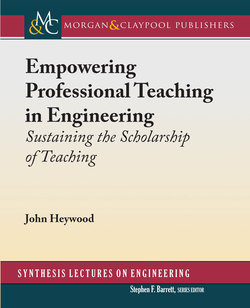Читать книгу Empowering Professional Teaching in Engineering - John Heywood - Страница 8
На сайте Литреса книга снята с продажи.
ОглавлениеForeword
Tertiary education has experienced both rapid evolution and several significant changes in mission since the Second World War. Much of the technologically advanced world has become increasingly reliant on tertiary education as a supplier of engineers and creative thinkers of all types. At the same time, this utilitarian view of education has transformed the public view of education, which more often than not these days is seen as a process through which graduates are “produced”, or as a “service” provided to an intellectual elite, which equips them for a successful and highly paid career. The view that education is about developing the individual and enhancing their intellectual capacity in the context of an academic environment which stimulated debate and enquiry has largely fallen by the wayside.
In this new landscape academic teachers are expected to perform research and teaching of the highest quality. High expectations in regard to teaching excellence has ben increasingly emphasised in the Nordic Countries, where in many places ten full time weeks of formal training in the theory and practice of tertiary education is a prerequisite for appointment to a tenure track position. Even in the United States of America the expectations in regard to teaching have changed significantly, not least in response to Boyer’s 1991 book “Scholarship Reconsidered: Priorities of the Professoriate”.
Quality in higher education is also an increasingly prominent component of the political discourse surrounding tertiary education. This book makes a significant contribution to both academic staff development and teaching quality by drawing together over fifty years of work in the area of evidence based teaching practice. The reader gains both new perspectives on teaching and assessment practices and a model for sustainable practice and professional development as a university teacher. Academic practice is more than research, the educational mission to inspire future generations of scholars to engagement and excellence in science and engineering underpins the success of our technological society.
The model and resources offered here form part of a broader effort in which Professor Heywood, myself, the American Society for Engineering Education (ASEE) and the IEEE Education Society are engaged. The goal is to provide sustainable support for academic teaching practice and professional development combined with international levels of professional recognition linked to a range of activities that promote and enhance the “Teaching as Research” model. This book is a vital resource in the pursuit of this goal, and it gives me great pleasure to have contributed in a small way to its conception and final form.
Arnold Pears
Professor and Chair of the Department of Learning in Engineering Sciences
KTH Royal Institute of Technology
Stockholm, Sweden
July 2017
